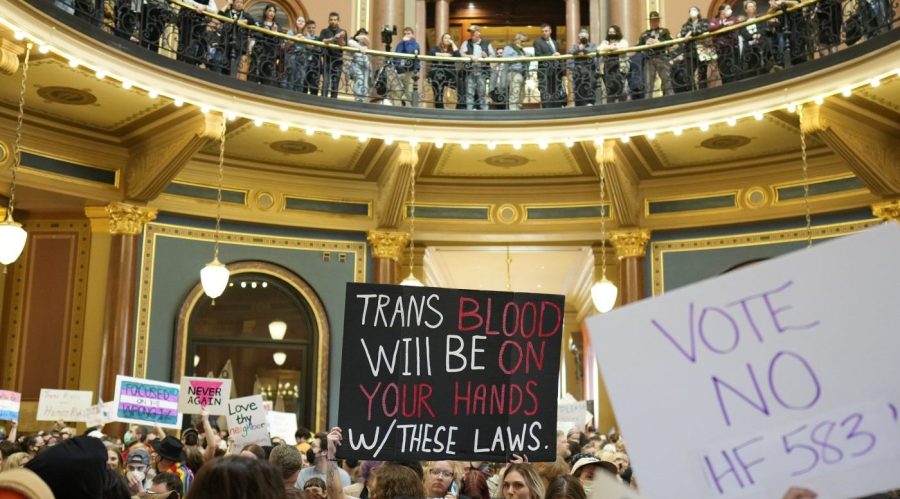
Iowa’s Republican-led Legislature voted Thursday to remove gender identity as a protected class from the state’s civil rights code, sending the first-of-its-kind measure to Gov. Kim Reynolds (R).
The bill, first introduced last week, sped through the legislative process despite widespread opposition from Democrats and LGBTQ rights advocates who flooded the statehouse in Des Moines to protest its passage. More than 2,500 people entered the building Thursday, the Des Moines Register reported, citing numbers from state capitol security, more than triple the roughly 600 who do on an average day.
Demonstrators filled the Iowa Capitol hallways Thursday, holding transgender and LGBTQ Pride flags and chanting, “No hate in our state!”
Senate File 583 removes gender identity as a protected class in the Iowa Civil Rights Act, the decades-old law protecting Iowans from discrimination in employment, housing, education and public accommodations. State lawmakers added protections for sexual orientation and gender identity in 2007 when Democrats controlled both chambers of the Legislature and the governor’s office.
The state Senate passed the measure Thursday in a 33-15 vote along party lines. Later, Iowa’s House voted 60-35 to approve the bill.
The gallery erupted in chants of “who’s next?’ following the Senate vote. Boos broke out after the House vote.
Iowa Republicans, who over the past three years have passed legislation to ban transgender youth from accessing gender-affirming care, restrooms, locker rooms and school sports teams that match their gender identity, argued this week that the measure was necessary to enforce those laws, and protect women and children.
“There’s been a lot of false hyperbole on the floor of this chamber today. Clearly, in my opinion, Democrats do not want to talk about the reality of the erasing of women as a result of gender identity based on feelings being elevated to a protected class status in the Iowa code,” said state Rep. Steven Holt, the Republican who introduced the measure.
Iowa Sen. Jason Schultz (R), the bill’s primary sponsor in the Senate, said state law could not protect both sex and gender identity.
“We had to pick one side or the other and not go halfway,” Schultz said Thursday.
Several GOP lawmakers cited an executive order from President Trump proclaiming the federal government recognizes only two sexes, male and female. The order is one of several Trump signed during his first month back in office to roll back transgender rights and deny the existence of trans, nonbinary and intersex people.
Reynolds, who has not said whether she will sign the measure, has signed at least six laws explicitly targeting transgender rights since her election in 2017. She introduced legislation last year that would have required the state to recognize Iowans based only on their sex at birth.
In sessions this week, Iowa Democrats slammed the proposal to remove gender identity as a protected class as cruel and unnecessary. They read aloud dozens of letters from transgender constituents and families with transgender kids urging lawmakers to vote against the measure.
“This state is going to become the first state in the nation to back up on civil rights,” Democratic state Sen. Jack Dotzler said Thursday, speaking directly to his Republican colleagues. “You get to carry that honor with you as long as you live because you’re going to take the votes to do it. When I go to my grave, I will not have to face that.”
Senate amendments that would have shielded transgender and gender-nonconforming people from discrimination in housing, employment and credit were overwhelmingly rejected by the upper chamber’s Republican supermajority.
“Thank you to the Republicans for making it abundantly clear what this bill is about,” state Sen. Matt Blake (D) said Thursday after the housing discrimination amendment was defeated. “This isn’t meant to protect anyone. It’s not. If it was meant to protect somebody, we would have narrowed the scope of this bill just now.”
Schultz said he rejected the amendments because he wanted the Legislature to pass “a 100 percent bill to provide clarity and predictability going forward.”
“If we have different policies going different directions, there is a chance that it could be questioned as to the true intent of the Legislature,” he said.
Asked whether he would be surprised to hear that a majority of transgender Americans have experienced harassment or discrimination in their workplace, Schultz said, “I don’t know. I’ve never thought about it.”
A November report by the Williams Institute found that 82 percent of transgender people had experienced discrimination at work, including being fired or verbally, physically or sexually harassed because of their sexual orientation or gender identity.
Iowa Rep. Aime Wichtendahl, a Democrat and the state’s first openly transgender lawmaker, said this week that the bill deprives trans people “of our life, liberty, and our pursuit of happiness.”
“It pains me to be here today,” Wichtendahl said Thursday. “It pains me to see how the rights of an entire group’s people can be so quickly and easily discarded. It pains me to hear the slander, and the fear leveled at the trans community — my community — my friends, and my family, people who just want to live their lives, to be themselves and to live free of fear. This is a fear that I have known.”
“The purpose of this bill, the purpose of every anti-trans bill, is to further erase us from public life and to stigmatize our existence,” she said. “The sum total of every anti-trans and anti-LGBTQ bill is to make our existence illegal, to force us back into the closet. If we want jobs or a place to live, we have to go back, is what they’re telling us because the authors of these bills wish us every harm.”












